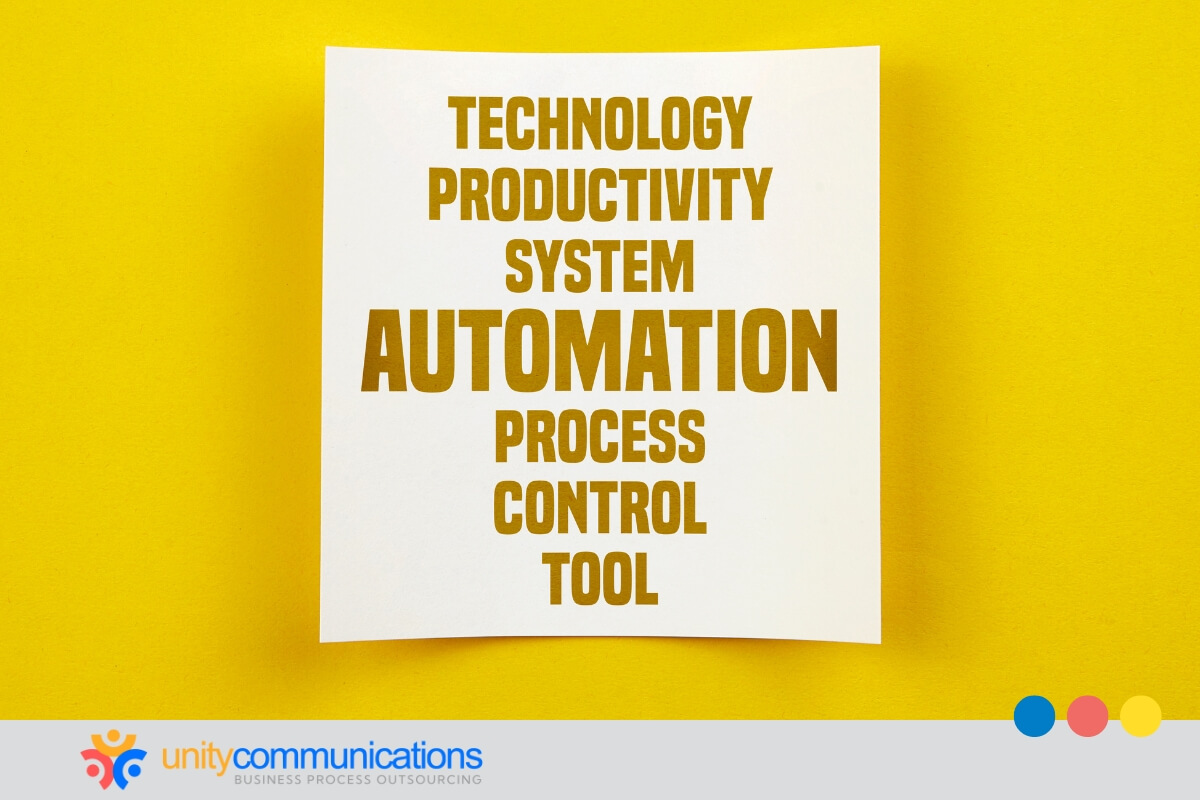Table of Contents
Knowledge process outsourcing (KPO) has evolved from a support function into a strategic asset. Today’s digital enterprises rely on it for execution, efficiency, and insight.
However, as the volume and complexity of data grow, so do the demands on this business process outsourcing (BPO) model to deliver faster insights and maintain data accuracy. Specialized providers invest in artificial intelligence (AI) to deliver high-quality support without straining resources.
This article explores how AI impacts KPO services. It discusses the importance of team upskilling and compliance to build a future-ready workforce and mitigate risks. Read below to learn more!
5 ways AI impacts KPO services

AI redefines how KPO providers deliver value from automating tasks to expediting decisions. This article shares seven ways technology helps providers move faster, work smarter, and stay ahead.
1. Automation of repetitive tasks
According to Strategic Market Research, robot process automation (RPA) can reduce 80% of labor-intensive jobs. These include contract tagging, compliance reporting, and invoice verification. This frees analysts to focus on other high-impact activities, such as product development.
It looks like this in action:
- Bots ingest unstructured data (e.g., PDFs or emails), extract key values, and instantly validate them against rules.
- Without human review, they trigger downstream actions (such as payment processing or CRM updates).
- Each cycle generates a clear audit trail, speeding up approvals and audits.
For example, a KPO handling compliance checks for a pharmaceutical firm uses RPA to scan adverse event reports, categorize them, and alert reviewers in minutes.
These bots also learn over time. Feedback loops refine their performance, helping them accurately flag edge cases and exceptions. The result? Less time cleaning data means more time applying insights.
2. AI-driven data analytics and decision-making
Speed is a strategic advantage, especially since business environments evolve rapidly. Decisions made too late can lead to missed opportunities, financial loss, or competitive setbacks.
Companies increasingly rely on AI-powered analytics to achieve speed. According to a McKinsey survey, 65% of organizations use generative AI regularly to enhance decision-making and generate insights from unstructured data faster.
Predictive analytics and conversational interfaces also allow teams to ask complex questions in plain language and receive real-time, data-driven answers. Instead of sifting through dashboards or spreadsheets, decision-makers now ask, “Which clients are at risk of churn in Q3?” and receive “Top 5 accounts likely to churn based on contract terms, NPS scores, and support history.”
AI tools make this possible by:
- Embedding models into business intelligence platforms
- Using natural language processing (NLP) interfaces
- Continuously updating predictions as new data flows in
AI impacts KPO services by elevating a data analyst to a strategic adviser. Embedding AI and machine learning into dashboards can transform raw metrics into recommendations that drive growth.
3. Cost reduction from integration
Cost remains a top reason to outsource, and AI helps companies save significantly. According to Deloitte’s Global Outsourcing Survey 2024, the adoption reached up to 98% in some industries. About 25% reported huge savings in vendor costs.
AI delivers cost efficiency not by replacing teams outright but by optimizing effort:
- Bots operate 24/7 at a lower cost than full-time teams.
- Algorithms catch billing errors before they’re paid.
- Workload balancers shift resources dynamically to avoid overstaffing.
For instance, a media firm outsources ad spend reconciliation. AI flags $180,000 in duplicate entries in one quarter before the invoices hit finance.
AI turns outsourcing into a leaner, smarter investment by automating routine tasks, eliminating waste, and optimizing resource allocation in real time.
4. Enhanced accuracy and transparency
Fatigue-driven mistakes are costly. Inaccuracies can increase the risks of hefty penalties and fines, reputational damage, and loss of stakeholder trust. AI prevents errors by reducing human intervention.
AI detects anomalies in financial records faster than junior auditors while creating a paper trail for transparency, a system that handsomely pays off. A 2022 peer-reviewed study shows that a one-standard-deviation increase in audit-AI investment slashed restatement risk by 5% and trimmed audit fees by nearly 1%.
In legal research, NLP tools extract precedents and clauses from millions of documents with excellent precision and automatically classify and summarize unstructured data. Meanwhile, medical reviews use AI to flag inconsistencies in radiology reports or patient notes.
As part of strategic outsourcing, AI enhances transparency to improve KPO’s service quality, strengthen your compliance, and build client trust, especially in highly regulated industries.
5. Scalability
In traditional models, more work meant more people. With AI, scale relates to processing power, not payroll. Consider these examples:
- A social listening task involving analyzing 1 million posts used to take five analysts a week. With NLP models on cloud graphics processing units (GPUs), the same number of people can accomplish it in half a day.
- Containerized AI models allow KPO providers to quickly replicate solutions for new clients, reducing setup time from months to minutes.
- A KPO firm in marketing analytics shortens client onboarding from 12 weeks to 2 by reusing AI workflows trained on similar industries.
This scalability showcases how AI impacts KPO services. The tech enables faster, more cost-effective project delivery without the need for massive analyst teams.
Skill shifts: Upskilling KPO teams for AI collaboration and compliance
AI can automate tasks. But human thinking is essential to interpret context, make ethical judgments, and apply strategic insight that machines can’t replicate.
Forward-thinking KPO firms are adapting fast. They develop prompt engineering labs and rotate seasoned analysts through model governance exercises to understand AI bias and drift. Micro-credentials track skills in NLP, RPA orchestration, and data management. Blending technical and strategic expertise ensures analysts stay relevant and valuable.
Meanwhile, the growing use of generative AI increases risks in cybersecurity breaches, inaccurate outputs, and a lack of model explainability. This highlights the urgent need for robust ethical frameworks.
Leading KPO providers address this by:
- Including model cards, fairness metrics, and explainability clauses in service-level agreements (SLAs)
- Including privacy-by-design architecture and role-based access controls to protect sensitive data in RPA
- Forming responsible AI councils where stakeholders collaborate to review new use cases
Innovation and governance ensure compliance, safeguard trust, and highlight how AI impacts KPO services. It transforms task-driven roles into consultative, secure, insight-driven positions.
Future trends: AI’s long-term role in KPO strategy
The future of work is AI, and reliable KPO providers are developing strategies to seamlessly blend automation with human expertise to help clients stay competitive.
- KPO firms invest in industry-specific foundation models and no-code AI studios that let clients co-create algorithms.
- Edge deployments will push analytics closer to data sources.
- Quantum-ready encryption will unlock sensitive workloads.
- Multilingual LLMs will flatten language barriers across global delivery centres.
By definition, BPO companies handle rule-based tasks such as claims or payroll. KPO involves richer analytics. Those boundaries blur as AI automates both. Industry experts predict the technology will soon seize most routine, data-heavy audit, tax, and advisory work.
AI and big data will also reshape white-collar roles by changing the skill sets required and shifting focus from execution to judgment. These future trends emphasize how AI impacts KPO services over the long term.
The bottom line

KPO has long relied on intellectual expertise, but with AI, it gains unmatched computational power and strategic clarity. Automation reduces costs, advanced analytics drive faster insights, and strong governance safeguards trust.
To remain competitive today, business leaders must pilot, adapt, and scale AI-driven solutions before others do. Unity Communications is here to help lead that transformation. Let’s connect and design a KPO model that delivers speed, scale, and strategy today with AI.



